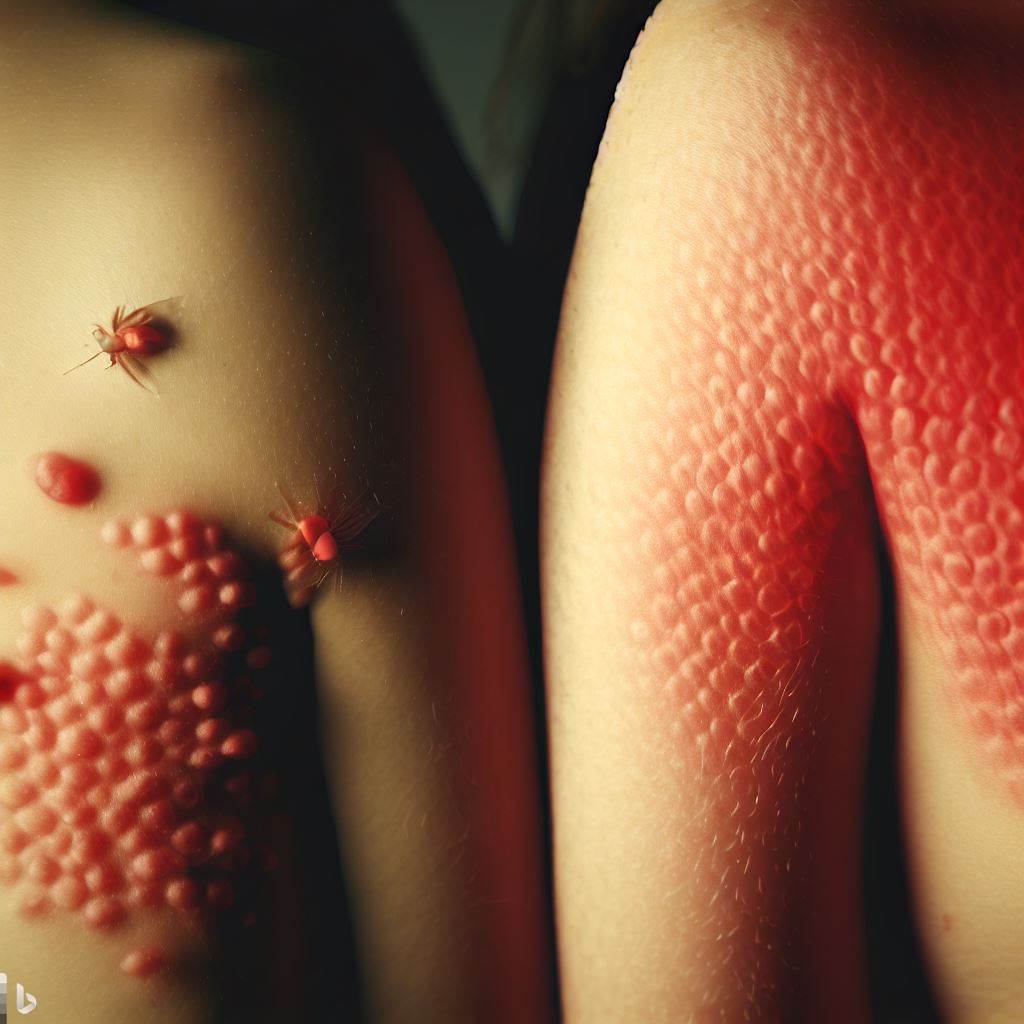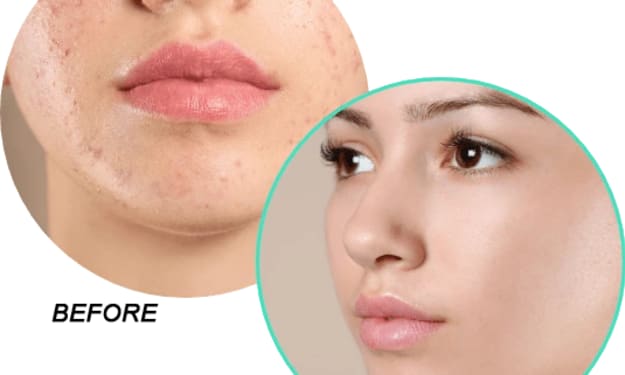Hives vs Eczema: Knowing the differences and similarities
Knowing the differences and similarities

Skin conditions can be bothersome and often cause discomfort. Two common skin conditions that can affect individuals are hives and eczema. Although they share some similarities, it is important to understand the differences between these two conditions to ensure proper management and treatment. In this blog post, we will explore the definition, symptoms, causes, and treatment options for hives and eczema. By the end of this article, you will have a clearer understanding of these conditions and be equipped with the knowledge to seek appropriate care.
I. Hives (Urticaria)
A. Definition, Symptoms, and Causes of Hives
Hives, also known as urticaria, are characterized by itchy, raised welts on the skin. These welts can vary in size and shape and are typically red or pink. Hives occur as a result of the release of histamine and other chemicals in the body. The most common symptoms of hives include itching, swelling, and a burning or stinging sensation.
B. Factors that Trigger Hives
Hives can be triggered by various factors, including allergic reactions to certain foods, medications, insect bites, or environmental factors such as pollen or pet dander. Other triggers may include stress, temperature changes, or even pressure on the skin.
C. How Hives Appear on the Skin
When hives appear on the skin, they can be flat or raised and often have a defined border. These welts can appear on any part of the body and may change shape or location within a matter of hours. In some cases, hives may be accompanied by angioedema, which involves swelling in the deeper layers of the skin.
D. Duration of Hives and Common Patterns
Hives can be acute or chronic. Acute hives typically last for a few hours to several days and are often triggered by an allergic reaction. Chronic hives, on the other hand, persist for more than six weeks and may require ongoing management. Some individuals may experience recurring episodes of hives, while others may have them for an extended period.
E. Available Treatment Options for Hives
The treatment for hives focuses on relieving symptoms and identifying and avoiding triggers. Antihistamines are commonly used to reduce the itching and inflammation associated with hives. In more severe cases, corticosteroids or other medications may be prescribed. It is essential to consult a healthcare professional for an accurate diagnosis and appropriate treatment.
F. Self-Care Tips and Home Remedies for Hives
In addition to medical treatment, there are several self-care tips and home remedies that can help manage hives. These include avoiding known triggers, applying cool compresses to the affected areas, wearing loose-fitting clothing, and practicing stress-reducing techniques such as meditation or deep breathing exercises.
II. Eczema (Atopic Dermatitis)
A. Definition, Symptoms, and Causes of Eczema
Eczema, also known as atopic dermatitis, is a chronic inflammatory skin condition. It is characterized by dry, itchy, and inflamed patches of skin. Eczema often appears in childhood and may persist into adulthood. The symptoms of eczema can vary but commonly include redness, itching, dryness, and the formation of small bumps or blisters.
B. Different Types of Eczema
There are several different types of eczema, including atopic dermatitis, contact dermatitis, nummular eczema, and seborrheic dermatitis. Each type has its own unique triggers and characteristics, but they all share the common feature of skin inflammation and irritation.
C. Common Locations Where Eczema Develops
Eczema can develop on any part of the body, but it is most commonly found on the face, hands, feet, and the inside of the elbows and knees. The location and severity of eczema can vary from person to person.
D. Triggers and Aggravating Factors for Eczema
Eczema flare-ups can be triggered or aggravated by various factors, including irritants such as harsh soaps or detergents, allergens like pollen or pet dander, changes in temperature or humidity, and stress. Identifying and avoiding these triggers can help manage and prevent eczema flare-ups.
E. Medical Treatments for Eczema
Treatment options for eczema aim to relieve symptoms, reduce inflammation, and prevent flare-ups. Topical corticosteroids and moisturizers are commonly prescribed to manage the symptoms of eczema. In more severe cases, oral medications or light therapy may be recommended. It is important to consult a healthcare professional for a personalized treatment plan.
F. Lifestyle Changes and Home Remedies for Eczema
In addition to medical treatments, certain lifestyle changes and home remedies can help manage eczema. These include keeping the skin moisturized, avoiding harsh soaps or detergents, wearing soft and breathable fabrics, using mild skincare products, and implementing stress-reducing techniques.
III. Hives vs Eczema: Similarities and Differences
A. Overview of the Key Similarities between Hives and Eczema
Although hives and eczema are distinct conditions, they do share some similarities. Both conditions can cause itching and discomfort and may be triggered by allergic reactions. Additionally, stress and certain environmental factors can contribute to the development of both hives and eczema.
B. Highlighting the Primary Differences in Symptoms, Appearance, and Triggers
Despite the similarities, hives and eczema have distinct differences in symptoms, appearance, and triggers. Hives are characterized by raised welts that are typically short-lived and can move across the body. In contrast, eczema presents as dry, red, and itchy patches of skin that can be chronic and persistent. The triggers for hives often involve allergic reactions, while eczema can be triggered by irritants, allergens, or a combination of genetic and environmental factors.
C. How Diagnosis is Made for Hives and Eczema
Diagnosing hives and eczema typically involves a thorough examination of the skin and a detailed medical history. A healthcare professional may also perform additional tests or allergy assessments to determine the underlying cause or triggers of the condition.
D. Clarifying Misconceptions or Common Confusion between the Two Conditions
Hives and eczema can sometimes be confused due to overlapping symptoms or the appearance of similar skin reactions. However, understanding the key differences between the two conditions is crucial for accurate diagnosis and appropriate management.
IV. Taking care of Hives and Eczema
A. Importance of Seeking Medical Advice for Accurate Diagnosis
If you are experiencing symptoms of hives or eczema, it is essential to seek medical advice for an accurate diagnosis. A healthcare professional can assess your condition, identify triggers, and develop an appropriate treatment plan tailored to your specific needs.
B. Strategies for Preventing Hives and Eczema Flare-ups
Preventing flare-ups of hives and eczema involves identifying and avoiding triggers. This may include eliminating known allergens from your environment, using gentle skincare products, maintaining a healthy lifestyle, and practicing stress management techniques.
C. Long-Term Management Approaches for Both Conditions
Managing hives and eczema requires a long-term approach. This may involve regular follow-ups with a healthcare professional, adhering to prescribed treatments, implementing lifestyle changes, and maintaining a skincare routine that focuses on hydration and protection.
D. The Role of Lifestyle Modifications and Stress Management
Adopting a healthy lifestyle, including a balanced diet and regular exercise, can have a positive impact on both hives and eczema. Additionally, managing stress through relaxation techniques, exercise, or seeking support from friends and family can help reduce the frequency and severity of flare-ups.
E. Support Groups and Resources for Individuals with Hives and Eczema
Living with hives or eczema can be challenging, but support is available. Online and offline support groups provide a platform for individuals to connect, share experiences, and learn from others facing similar challenges. Additionally, reputable resources, such as medical websites and patient advocacy organizations, offer valuable information and guidance.
V. final taught
In conclusion, understanding the differences and similarities between hives and eczema is crucial for proper management and treatment. While hives are characterized by raised welts that appear and disappear quickly, eczema presents as chronic dry, red, and itchy patches of skin. Seeking medical advice, identifying triggers, and adopting appropriate management strategies are key to effectively managing these conditions and improving the quality of life for individuals affected by hives and eczema.
>>> READ MORE
FAQs (Frequently Asked Questions)
Can hives and eczema be cured completely?
Unfortunately, there is no cure for hives or eczema. However, with proper management and treatment, symptoms can be controlled, and flare-ups minimized.
Are hives and eczema contagious?
No, neither hives nor eczema is contagious. They are skin conditions that result from various triggers and underlying factors.
Can stress worsen hives and eczema?
Yes, stress can potentially worsen symptoms and trigger flare-ups of both hives and eczema. Managing stress through relaxation techniques and stress-reducing activities is beneficial.
Are there any specific foods that can trigger hives or eczema?
Certain foods, such as shellfish, nuts, dairy products, or eggs, can trigger hives in individuals with food allergies. Eczema triggers can vary among individuals but may include certain foods, such as dairy, gluten, or citrus fruits.
When should I seek medical attention for hives or eczema?
If you are experiencing severe symptoms, such as difficulty breathing or swallowing, or if the condition significantly affects your daily life, it is important to seek immediate medical attention.
About the Creator
VitalityVibe
Welcome to VitalityVibe, your ultimate resource for unlocking your health potential and embracing a vibrant life. Our platform is designed to inspire and guide you on your journey to holistic well-being.






Comments
There are no comments for this story
Be the first to respond and start the conversation.